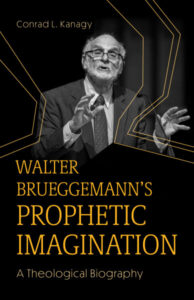A Presidential Address
Here’s another excerpt from Conrad L. Kanagy’s upcoming biography entitled Walter Brueggemann’s Prophetic Imagination: A Theological Biography.
Preorder here:
Subscribe to get notified as additional excerpts are posted.
Brueggemann awoke earlier than usual, ahead of the alarm clock he set the night before. He had slept fitfully, lying awake wondering why and how he had followed his calling this far. He thought for a moment of his father August, and how proud he would be of his youngest son, whose efforts to go against the scholarly flow of biblical studies had led to this moment on November 17, 1990. “I’ve indeed been ahead of the pack,” Brueggemann thought to himself. The truth was that he had always worked as if from behind the pack! But his efforts to dismantle the historical-critical analysis of the biblical text and move toward rhetorical analysis with a social scientific interpretive bent had contributed to today’s legitimation of both himself as a scholar but also his mode of analysis.
Later that evening, Brueggemann would give the presidential address to the Society of Biblical Literature, the oldest and most prestigious of the scholarly societies that focused on interdisciplinary research about the Bible. August, his father with no high school diploma, had struggled to get through Eden Seminary. His son had written twenty books since the eruption of The Prophetic Imagination in 1978. Brueggemann also transferred in 1986 from his beloved Eden Seminary to the more prestigious and financially better endowed Columbia Seminary in Atlanta, Georgia. Offered a lighter teaching load, a full-time secretary, and greater financial support for his research and writing, Brueggemann had taken the bait—though tension with the direction of Eden Seminary under new presidential leadership and the transition of Brueggemann out as Dean of Academic Affairs had made the bait more alluring this time.
It was certainly not the first offer he had received since the publication of The Prophetic Imagination, but it was the first he accepted. Leaving Eden Seminary behind, a seminary that in fifteen years he had formed in his own image in many ways, was more difficult than he had anticipated. And his departure was hard on his colleagues also, many of whom he was responsible for hiring. Leaving idyllic Webster Groves where his boys had grown up within walking distance of the seminary, boys he whistled at to get their ball gloves for a round of pitch and catch following another long day at work, pulled at his heart also. Both had grown up so quickly and both had become so responsible. Both worked like their father, too hard he sometimes thought. But a look in the mirror reminded him of the reasons they did so. And they didn’t hesitate to remind him also when he dared bring it up. Little did he know, however, that his future colleagues were nearly giddy with disbelief at their luck in landing a colleague of Brueggemann’s stature. And while some of their children had no idea who their parents were so excited about, rumors had begun to circulate among their daughters that the Brueggemann package included sons Jim and John. Brueggemann was not simply a rising star, but a star already in Old Testament studies. He also reflected the character of Columbia Seminary at the time, with its strong focus on preparing persons for ministry. So it was a great thing for those waiting in Atlanta.
Shifting his thoughts back to the upcoming evening, Brueggemann reflected again on the eruption of The Prophetic Imagination more than a decade ago and how its bestseller status had moved him from relative obscurity to become among the most recognizable name of any American theologian of the day! And with so much of the positive response coming from pastors and the church, he also realized that the very reason some of his peers had neglected to acknowledge the value of his work—because it was a scholarship for the church— was also the reason for the book’s success. There were few other scholars at the SBL meeting that year who had come even close to the number of books Brueggemann had sold, let alone just for one title. If the ax he had been called to grind was The Prophetic Imagination, Brueggemann had been grinding if for all it was worth and he was not about to stop on this momentous day! It remained the primary lens through which he interpreted the biblical text. In many ways, this had always been and always would be true.

0 Comments